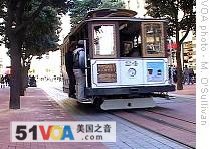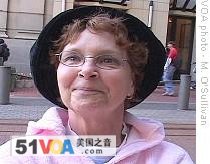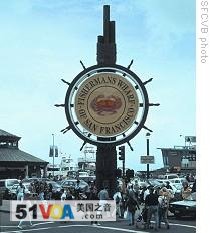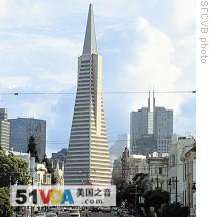San Francisco
10 March 2009
 |
| A San Francisco cable car |
There is still energy on the streets of San Francisco. On busy Market Street, a trio of tap dancers entertains passers-by. And tourists are still riding the fabled cable cars.
 |
| Roberta Halquist |
"And we're riding the trolley," she said. "We rode it up and over from Fisherman's Wharf and now we're riding it up and over again."
 |
| Fisherman's Wharf is still a working fishing pier, bringing in thousands of tons of fresh fish and crabs annually |
Dan Goldes of the San Francisco Convention and Visitors Bureau says 2008 was not a bad year.
"2009 is shaping up to be a challenging year," he said. "Between the economy in the U.S. being sort of rocky shoals and the economy in other countries being on rocky shoals, that has a pretty big impact on international visitation to San Francisco."
Business travel is also slowing. He says major trade associations book their annual conventions years in advance, and so they seldom cancel, but they have fewer attendees when the economy is slow. Smaller business groups are more likely to cut back when the economy turns sour.
San Francisco is one of the world's leading high-tech centers, and Leander Kahney of the website Wired.com says the recession and job losses were slow to hit the sector. But he says the venture capital that the industry relies on has dried up. High-tech sales are also hurting.
"I think companies have stopped spending money," he said. "They're not updating their infrastructure, so I think it's going to catch up unless things bottom out and turn around soon."
The research company Gartner, Inc. projects that worldwide shipments of personal computers will drop nearly 12 percent this year.
 |
| The tallest building in San Francisco at 835 feet, the Transamerica Pyramid marks edge of city's financial district |
The city had an unemployment rate of eight percent in January, close to the national average and about two percent better than California as a whole. Across the bay in Oakland, unemployment has passed nine percent and jobless numbers area-wide have been rising. Economist Egan is bracing for tougher times, but says he is optimistic for the long run.
"We were not expecting recession and now we have one, so there's that element of surprise. But I think if you look objectively at the economy, San Francisco is a very strong urban economy compared to other places in the United States," he said. "The fundamentals of this city economically are extremely strong and there's every reason to be optimistic that we'll bounce back and be strong in the future."
San Francisco is a relatively rich and educated city. It has one of the highest percentages of college graduates of any urban center. It also has many recent immigrants and senior citizens, often with low incomes, and local officials say the recession hits them hardest.
San Francisco has survived earlier downturns, from the Great Depression of the 1930s to the dot-com crash of 2001, when the Internet bubble collapsed and many companies disappeared. A century ago, the city was almost leveled by a great earthquake and fire. It bounced back fairly quickly, and people here say San Francisco today remains resilient.